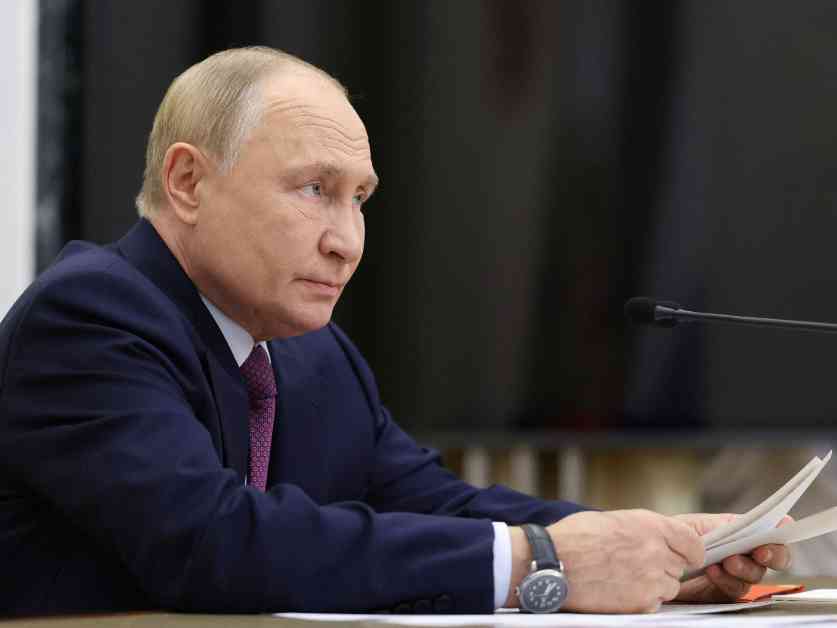Russian President Vladimir Putin sent shockwaves through the international community on Wednesday when he announced a significant shift in Moscow’s nuclear policy. In a televised meeting of Russia’s Security Council, Putin detailed changes to the country’s nuclear doctrine, effectively lowering the threshold at which Russia might use nuclear weapons.
Putin’s warning came amidst escalating tensions in Ukraine, where the government has been pressuring NATO members to allow it to use their long-range missiles for strikes deep inside Russian territory. The Russian leader’s message was clear: any attack that poses a “critical threat” to Russia’s sovereignty, carried out by a non-nuclear power with the support of a nuclear power, would be considered a “joint attack on the Russian Federation.”
This shift in Russia’s nuclear policy raises concerns about the potential consequences for the ongoing war in Ukraine. The country has the largest nuclear arsenal globally, with a stockpile of 6000 warheads, some of which are stationed in Belarus, Russia’s closest ally. By broadening the circumstances under which Russia might use nuclear weapons, Putin has effectively lowered the threshold for their use, increasing the potential targets for a nuclear strike.
Experts believe that Putin’s announcement was intended to deter the United States and its allies from supporting Ukraine in its conflict with Russia. With tensions already running high, Putin’s move has added a new dimension to an already volatile situation, raising questions about the possibility of nuclear escalation in the region.
While there is no imminent risk of nuclear conflict, experts warn that the implications of Putin’s announcement should not be underestimated. The international community must carefully monitor the situation and work towards de-escalating tensions to prevent any further escalation of the conflict in Ukraine.
Background and Context
The recent developments in Russia’s nuclear policy come in the wake of Ukraine’s surprise incursion into Russia’s Kursk region, which intensified the conflict between the two countries. Since then, Russian forces have launched a counteroffensive, pushing Ukrainian troops back from areas they had captured. However, Ukrainian forces remain inside Russian territory, with President Volodymyr Zelenskyy seeking approval from the US and the UK to use long-range missiles against targets inside Russia.
The conflict in Ukraine has been ongoing since Russia’s full-scale invasion in February 2022, with both sides vying for control of key territories. The situation has become increasingly complex, with multiple countries involved and competing interests at play. Putin’s announcement regarding Russia’s nuclear policy adds a new layer of uncertainty to an already volatile situation, raising concerns about the potential for further escalation.
Analysis and Implications
Putin’s decision to lower Russia’s nuclear threshold has significant implications for the ongoing conflict in Ukraine and the broader geopolitical landscape. By expanding the circumstances under which Russia might use nuclear weapons, Putin has raised the stakes in the conflict, increasing the potential for a catastrophic escalation.
The new policy allows Russia to target non-nuclear states if they attack with the support of nuclear-armed nations. This broadens the scope of potential targets for a nuclear strike, creating a more complex and dangerous situation. Additionally, by framing such attacks as a “joint attack,” Putin has opened the door for Russia to target Ukraine’s nuclear-armed allies directly, further escalating the conflict.
The announcement has raised concerns among experts about the potential for nuclear escalation in the region. While there is currently no imminent risk of conflict, the situation remains precarious, with the possibility of miscalculation or misunderstandings leading to a dangerous escalation. The international community must work together to de-escalate tensions and prevent any further escalation of the conflict in Ukraine.
In conclusion, Putin’s decision to lower Russia’s nuclear threshold has significant implications for the ongoing conflict in Ukraine and the broader geopolitical landscape. The international community must remain vigilant and work towards de-escalating tensions to prevent any further escalation of the conflict.



























